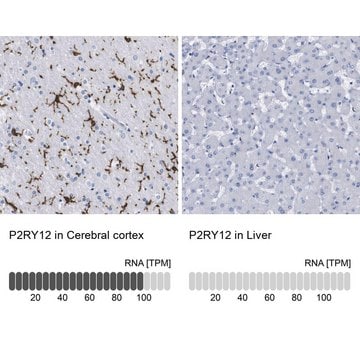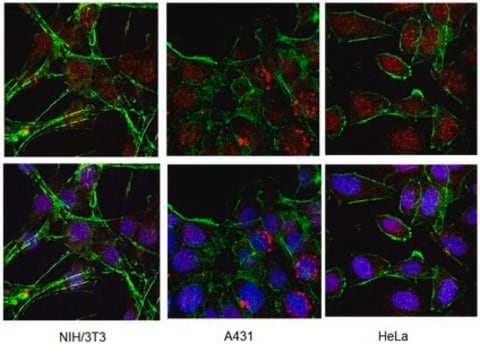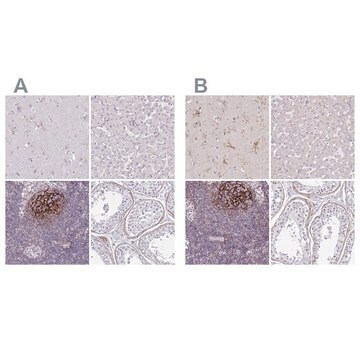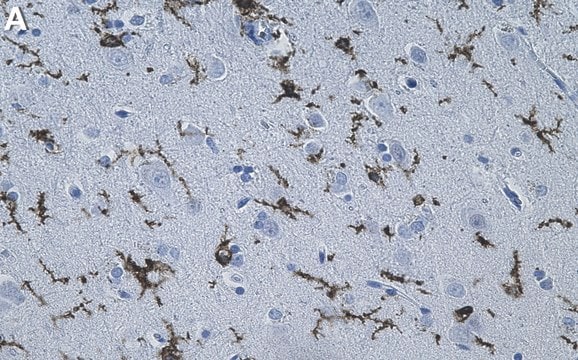HPA051870
Anti-TMEM119 antibody produced in rabbit

Prestige Antibodies® Powered by Atlas Antibodies, affinity isolated antibody, buffered aqueous glycerol solution
동의어(들):
Tmem119 Antibody, Tmem119 Antibody - Anti-TMEM119 antibody produced in rabbit, Anti-transmembrane protein 119
로그인조직 및 계약 가격 보기
모든 사진(6)
About This Item
추천 제품
생물학적 소스
rabbit
Quality Level
결합
unconjugated
항체 형태
affinity isolated antibody
항체 생산 유형
primary antibodies
클론
polyclonal
제품 라인
Prestige Antibodies® Powered by Atlas Antibodies
양식
buffered aqueous glycerol solution
종 반응성
human
향상된 검증
independent
orthogonal RNAseq
Learn more about Antibody Enhanced Validation
기술
immunohistochemistry: 1:500-1:1000
면역원 서열
GDGARMVEGRGAEEEEKGSQEGDQEVQGHGVPVETPEAQEEPCSGVLEGAVVAGEGQGELEGSLLLAQEAQGPVGPPESPCACSSVHPS
UniProt 수납 번호
배송 상태
wet ice
저장 온도
−20°C
타겟 번역 후 변형
unmodified
유전자 정보
human ... TMEM119(338773)
일반 설명
Transmembrane protein 119 (TMEM119) is encoded by the gene mapped to human chromosome 12q23.3. The encoded protein belongs to the transmembrane protein family. TMEM119 has an O-glycosylated N-terminal region.
면역원
transmembrane protein 119 recombinant protein epitope signature tag (PrEST)
애플리케이션
Anti-TMEM119 antibody produced in rabbit has been used in immunohistochemistry.
생화학적/생리학적 작용
Transmembrane protein 119 (TMEM119) acts as an osteoinductive factor and facilitates proliferation, migration and invasion of osteosarcoma cells.(28} It is a critical molecule acting downstream of the parathyroid hormone (PTH) and similar to mothers against decapentaplegic-3 (Smad3) signaling pathways in osteoblasts. TMEM119 is considered to be a potential microglial marker that differentiates resident microglia from blood-derived macrophages in the human brain. Mutation in the gene is associated with the development of osteosarcoma.
특징 및 장점
Prestige Antibodies® are highly characterized and extensively validated antibodies with the added benefit of all available characterization data for each target being accessible via the Human Protein Atlas portal linked just below the product name at the top of this page. The uniqueness and low cross-reactivity of the Prestige Antibodies® to other proteins are due to a thorough selection of antigen regions, affinity purification, and stringent selection. Prestige antigen controls are available for every corresponding Prestige Antibody and can be found in the linkage section.
Every Prestige Antibody is tested in the following ways:
Every Prestige Antibody is tested in the following ways:
- IHC tissue array of 44 normal human tissues and 20 of the most common cancer type tissues.
- Protein array of 364 human recombinant protein fragments.
결합
Corresponding Antigen APREST85802
물리적 형태
Solution in phosphate buffered saline, pH 7.2, containing 40% glycerol and 0.02% sodium azide.
법적 정보
Prestige Antibodies is a registered trademark of Merck KGaA, Darmstadt, Germany
면책조항
Unless otherwise stated in our catalog or other company documentation accompanying the product(s), our products are intended for research use only and are not to be used for any other purpose, which includes but is not limited to, unauthorized commercial uses, in vitro diagnostic uses, ex vivo or in vivo therapeutic uses or any type of consumption or application to humans or animals.
적합한 제품을 찾을 수 없으신가요?
당사의 제품 선택기 도구.을(를) 시도해 보세요.
Storage Class Code
10 - Combustible liquids
WGK
WGK 1
가장 최신 버전 중 하나를 선택하세요:
Copy number variation analysis reveals additional variants contributing to endometriosis development.
Mafra F, et al.
Journal of Assisted Reproduction and Genetics, 34(1), 117-124 (2017)
Zhen-Huan Jiang et al.
Experimental & molecular medicine, 49(5), e329-e329 (2017-05-13)
Osteosarcoma is suggested to be caused by genetic and molecular alterations that disrupt osteoblast differentiation. Recent studies have reported that transmembrane protein 119 (TMEM119) contributes to osteoblast differentiation and bone development. However, the level of TMEM119 expression and its roles
Tobias Zrzavy et al.
Brain pathology (Zurich, Switzerland), 28(6), 791-805 (2017-12-10)
Inflammatory mechanisms, involving granulocytes, T-cells, B-cells, macrophages and activated microglia, have been suggested to play a pathogenic role in experimental models of stroke and may be targets for therapeutic intervention. However, knowledge on the inflammatory response in human stroke lesions
Transcriptomic analysis of purified human cortical microglia reveals age-associated changes.
Galatro T F, et al.
Nature Neuroscience, 20(8), 1162-1162 (2017)
Involvement of the osteoinductive factors, Tmem119 and BMP-2, and the ER stress response PERK?eIF2??ATF4 pathway in the commitment of myoblastic into osteoblastic cells.
Tanaka K I, et al.
Calcified Tissue International, 94(4), 454-464 (2014)
자사의 과학자팀은 생명 과학, 재료 과학, 화학 합성, 크로마토그래피, 분석 및 기타 많은 영역을 포함한 모든 과학 분야에 경험이 있습니다..
고객지원팀으로 연락바랍니다.






![Anti-Integrin αM [CD11b] Antibody, clone OX-42 clone OX-42, Chemicon®, from mouse](/deepweb/assets/sigmaaldrich/product/images/185/342/c1c1635a-3611-4b61-a5f0-daaa909d1801/640/c1c1635a-3611-4b61-a5f0-daaa909d1801.jpg)

